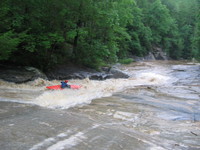
SC Attorney General Offers Opinion on River Access
South Carolina Attorney General Henry McMaster has issued a legal opinion regarding the public’s rights to navigable rivers. Amongst other responsibilities, the Attorney General “Issues official legal opinions upon request by constitutional officers, members of the General Assembly, and certain state and local officials” (Source: www.scattorneygeneral.org). These opinions are not a substitute for a definitive judicial ruling. However, they do guide the officers and agents of the State in their law enforcement practices. Special thanks to the Honorable Harry Cato, Member, House of Representatives, for requesting this opinion on the public’s behalf.
This opinion supports the rights of the “recreating public” (paddlers, fishermen, etc…) to access navigable rivers using road right-of-ways and to stand on the riverbed between the ordinary high-water marks. After discussion of relevant law and cases, the statement is made:
As we previously mentioned, section 4 of article XIV of the South Carolina and section 49-1-10 of the South Carolina Code ensure the public’s right of free use of all navigable waters. Although the landowner granting the easement may not have contemplated the use of such rights-of-way as a means to access navigable waters, finding that these rights-of-way provide such access would further the public purpose of allowing access to navigable waters. Furthermore, use of the rights-of way in this manner is consistent with their character as providing a means of travel for the public. Section 4 of article XIV specifically refers to navigable waters as “public highways.” DOT rights-ofway are also used as “public highways.” Therefore, we believe a court could find that the facilitation of access from one public right-of-way to another is consistent with the purpose of the DOT rights-of- way. While not free from doubt, because finding DOT rights-of-way provide the public with access to navigable waters is both consistent with the public policy of this State concerning navigable waters and appears consistent with the use of such rights-of-way as a public highway, we believe it reasonable for a court to conclude such access is available to the public.
On behalf of several fishermen, who had stated that they had been charged with trespassing for standing on land beneath a navigable waterway, we questioned their case. Knowing that many deeds lay claim to the land beneath navigable waters, we further questioned who must prove the legality of such a claim.
The opinion states: “Barring a specific grant of property below the high-watermark by the State of property below the high-water mark, we follow the presumption that the State owns the land. Further, because such land is held for the benefit of the public, we do not believe a member of the recreating public may be prohibited from standing on land below the high water mark by an adjacent property owner.”
In cases where a landowner has a deed claiming ownership to land beneath the high water mark, the Attorney General concluded that property owners with such a deed must prove “evidence of a specific grant from the State” but do not need to show proof of payment from the State. In general, this should be a rare exception, if it has occurred at all. The opinion sites State v. Hardee, 259 S.C 535, 539, 193 S.E.2d 497,499 (1972): “The burden was upon the appellant to prove her title to the land to the low water mark on Salt Creek. She has failed so to do and, therefore, cannot prevail.” This demonstrates that simply a deed stating ownership to the land beneath navigable waters is not enough to prove ownership. The deed holder must show proof that the State intended a transfer of ownership.
The Opinion can be read by downloading it from the Document box to the right of this article.
